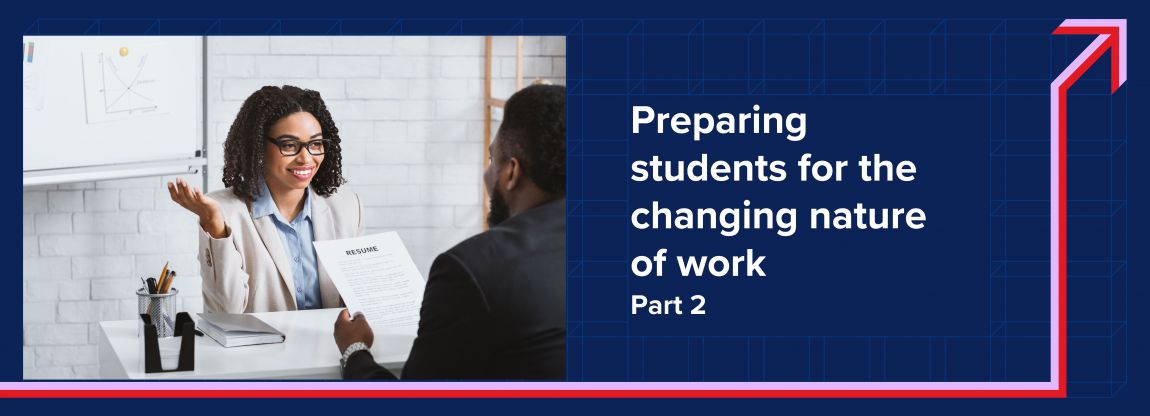Preparing students for the changing nature of work
Preparing students for the changing nature of work
Key Learnings from the Employability & Skills Conference 2022, Part 2
In Part 1, we explored the key takeaways from the Employability and Skills Conference around the future of work and what this means for students. In Part 2, we’ll explore employers needs and how we can showcase the value of graduates.
What do employers need?


Stephanie May, Early Careers Development Consultant, Experian shared her insights into working with universities to support students and graduates. A recurring theme was helping graduates to see where they have transferable skills for jobs, for example, highlighting courses through which they have developed analytical skills even if they are not doing a directly related Data Science course. Students need help to see this and articulate it clearly to potential employers. It was noted that this also relies on employers appreciating these transferable skills and being more degree agnostic with their application requirements.
From a workplace point of view, Experian is likely to continue with a hybrid arrangement, as it is working well, something that is common with many other employers. However, it was recognised that new entrants to the workplace may need support from employers in understanding how to navigate this hybrid way of working. Employers may also need to flexible around needs, for example, many young people are in a house share, and could want to come into an office, as it is a more productive environment for their situation.
An area they see many students struggle with is ‘managing up’ and having conversations about workload. As a Development Consultant, Stephanie is doing more to support them in having conversations about peaks and troughs and helping them to understand that adaptability and flexibility are important workplace skills. Employers can also help here by building accountability and ownership into every activity so that early career employees are invested in what they are doing, and can own their successes. With regards to encouraging more into STEM roles where there are a lot of vacancies, Experian have done work placements for first year students to consider career in STEM even they are not on a STEM degree. It was acknowledged that it is important to start earlier in education to encourage them to consider this route. Utilising recent graduates to go back and promote careers, can also help with this.
Showcasing the value of graduates
As already highlighted, a recurring theme from the event was how to support students to identify and articulate their skills, even if they are not directly related to a “standard” career route from that course. This was made clear in a session dedicated to entrepreneurship. It’s seen as a vital required mindset to protect employability for the future, and includes the following attitudes and/or skills:
- Adaptability
- An appetite for continuous learning and development
- Resilience
- Flexibility
- The ability to apply of enterprise behaviours and attributes for the creation of cultural, social or economic value, i.e., – creativity and innovation within the workplace
- Self-motivated, self-aware, tolerant of uncertainty, responsive, organised, curious, sensitive to values.


Currently entrepreneurship is mainly an extra-curricular activity, apart from on business and management courses where it is more embedded into the curriculum. But Professor Paul Jones, Professor in Entrepreneurship & Innovation, Swansea University argued that it needs to be embedded more into all degree courses, to bring subjects alive and provide more visibility of options to students. Ceri Nursaw, Chief Executive, National Centre for Entrepreneurship in Education (NCEE) shared an example at one institution where the Physics labs had businesses coming in with issues and concerns and students applying their knowledge to add value to solving real business problems. It made them apply the theory to real life challenges. This approach can also support with equity and access, for example, disabled people are more likely to work for small business or be self-employed than work for big businesses. So, there is an opportunity to support more there.
Though there are currently more vacancies than unemployed people, this isn’t necessarily at graduate job level. The key areas identified where more work can be done to support students are:
-
Articulating their value to employers
-
Working with academics and employers to embed work-related experiences into the degree and curriculum to help stand out in terms of employment
-
Developing career-readiness, identifing and developing those skills. Including offering practical skills applying for roles e.g., CVS and cover letter, help them find work experience plus working on being more confident, tackling imposter syndrome, exploring how to turn up at work, professional skills etc
-
Important for Universities to keep their finger on the labour market, including what skills are needed and bringing this into curriculum. E.g. hybrid working, how to bring those skills into learning, communicating with employers and understanding their needs. One key area is supporting students in being able to work independently, for example


Martin Edmondson, Chief Executive, Gradcore highlighted that workplaces with higher proportion of graduates are more productive and innovative. There are some threats politically which seem to be undermining graduates and making the case that graduates are over-valued in the economy and maybe should have less of them. Other pressures come from the Office for Students, putting value on certain types of degrees etc. So, it's another unsettling period. What can Universities do? Not be complacent about value of graduates. Lead the charge in proving value of graduates in the regions locally to them, in addition to producing fundamentally employable graduates with clear skills through teaching and assessment that is fully embedded, with students who understand these developed skills and are able to articulate them and demonstrate them to employers.
The main thing I took away from the conference was that the Higher Education sector, Local Authorities and Employers alike are all rooting for and looking for ways to nurture student talent. So, albeit another uncertain period, there is a lot of potential that comes from change.
Our simple-to-use digital platform SIMnet is perfect for learning Microsoft Office skills for the workplace, giving students lifelong access as well as badges to demonstrate their acumen to employers. Find out more about how SIMnet can boost student employability here.

